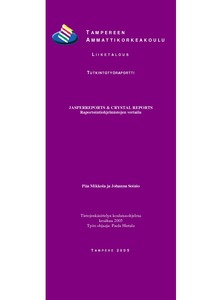The evolution of European sustainability reporting: challenges in collecting and reporting Environmental, Social, and Governance (ESG) data under the Corporate Sustainability Reporting Directive (CSRD)
Kudinov, Matvei (2025)
Kudinov, Matvei
2025
All rights reserved. This publication is copyrighted. You may download, display and print it for Your own personal use. Commercial use is prohibited.
Julkaisun pysyvä osoite on
https://urn.fi/URN:NBN:fi:amk-2025110326962
https://urn.fi/URN:NBN:fi:amk-2025110326962
Tiivistelmä
This research-based thesis examines the evolution of sustainability reporting in the European Union to better understand the challenges large companies face in collecting and reporting Environmental, Social and Governance (ESG) data under the current Corporate Sustainability Reporting Directive (CSRD).
The aim of this study is to first examine the chronological evolution of non-financial disclosures, beginning with voluntary practices, the first regulated directive such as the Non-Financial Reporting Directive (NFRD), the CSRD, as well as the recent adopted simplification package called Omnibus 1. This research examines not only the main drivers of change, key innovations, and practical challenges, but also how these developments are being adapted and perceived by professionals in the real corporate world.
Therefore, a desktop study method was used to research and collect data for the theoretical framework. A qualitative research approach was used to conduct interviews with the experts whose experience comes from consulting firms and large, publicly listed Finnish companies. Furthermore, a six-step thematic analysis process was utilized to analyse the obtained information, and a mono-phase design allowed for the connection of theoretical and empirical frameworks throughout the writing process.
Based on the results obtained, it is important to note that, although challenges remain in the areas of data availability and quality, the implementation of technologies in internal company processes, and employee expertise, the CSRD has already achieved certain results. First and foremost, it has influenced the perception of the importance of sustainability reporting in the corporate world. It has succeeded in not only increasing the standardization of processes through its innovations but also in improving the comparability of companies for all stakeholders. Furthermore, the adoption of Omnibus 1 was perceived more positively than negatively by experts, demonstrating the European Union's willingness to also accommodate companies in reducing administrative burdens and in moving closer to a broader goal such as the European Green Deal.
In conclusion, the evolution of European sustainability reporting has had a great impact on the collection and disclosure of ESG data under the CSRD. This long-standing process is becoming more structured and reliable each year, and all the accompanying innovations contribute to creating a more transparent and accountable European corporate market.
The aim of this study is to first examine the chronological evolution of non-financial disclosures, beginning with voluntary practices, the first regulated directive such as the Non-Financial Reporting Directive (NFRD), the CSRD, as well as the recent adopted simplification package called Omnibus 1. This research examines not only the main drivers of change, key innovations, and practical challenges, but also how these developments are being adapted and perceived by professionals in the real corporate world.
Therefore, a desktop study method was used to research and collect data for the theoretical framework. A qualitative research approach was used to conduct interviews with the experts whose experience comes from consulting firms and large, publicly listed Finnish companies. Furthermore, a six-step thematic analysis process was utilized to analyse the obtained information, and a mono-phase design allowed for the connection of theoretical and empirical frameworks throughout the writing process.
Based on the results obtained, it is important to note that, although challenges remain in the areas of data availability and quality, the implementation of technologies in internal company processes, and employee expertise, the CSRD has already achieved certain results. First and foremost, it has influenced the perception of the importance of sustainability reporting in the corporate world. It has succeeded in not only increasing the standardization of processes through its innovations but also in improving the comparability of companies for all stakeholders. Furthermore, the adoption of Omnibus 1 was perceived more positively than negatively by experts, demonstrating the European Union's willingness to also accommodate companies in reducing administrative burdens and in moving closer to a broader goal such as the European Green Deal.
In conclusion, the evolution of European sustainability reporting has had a great impact on the collection and disclosure of ESG data under the CSRD. This long-standing process is becoming more structured and reliable each year, and all the accompanying innovations contribute to creating a more transparent and accountable European corporate market.
Kokoelmat
Samankaltainen aineisto
Näytetään aineisto, joilla on samankaltaisia nimekkeitä, tekijöitä tai asiasanoja.
-
Corporate Responsibility Reporting Based on GRI Reporting Standard : Development of reporting of case companies Cargolux, Finnair and SAS
Jokinen, Minna (Metropolia Ammattikorkeakoulu, 2012)This thesis examined the corporate responsibility (CR) reporting. The thesis consists of theoretical part and a multiple case study, in which the CR reports of three European airlines are analysed. All of the case companies ... -
Case: Gasum’s responsibility reporting from the point of view of customers. Analyzing the current state and development needs for reporting
Seppänen, Ari (Saimaan ammattikorkeakoulu, 2015)The purpose of the study was to find out possible improvement issues and measure the quality of CR reporting based on opinions of Gasum’s customer representatives as well as the author’s, and internal GRI comparison for ... -
JasperReports & Crystal Reports : raportointiohjelmistojen vertailu
Mikkola, Piia; Soinio, Johanna (Tampereen ammattikorkeakoulu, 2005)



